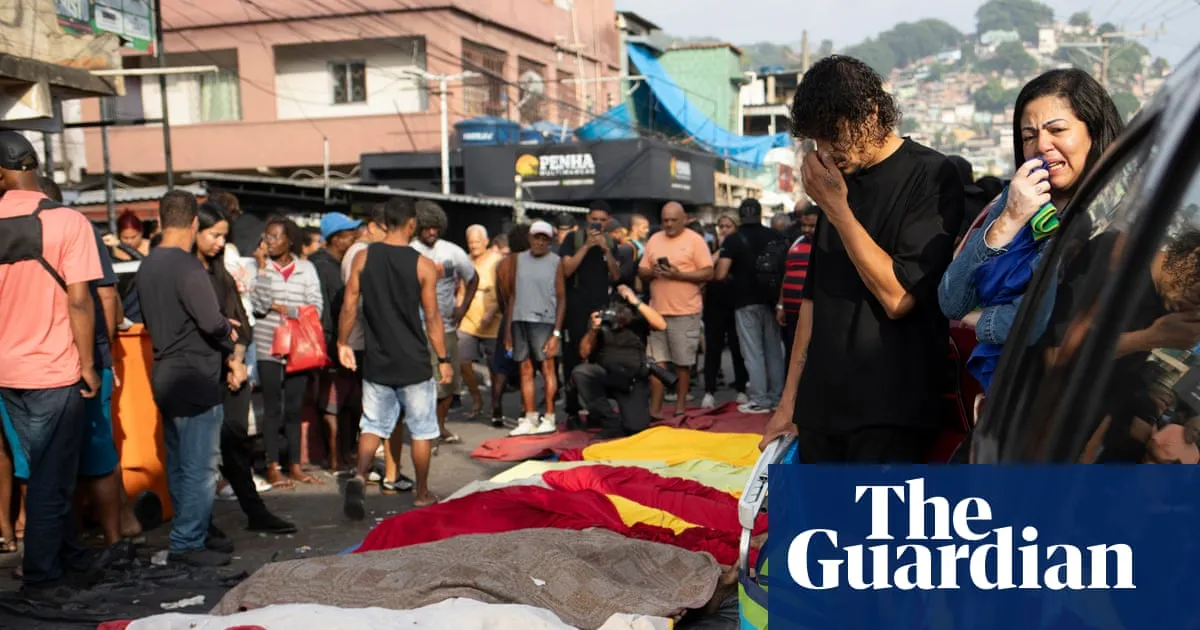
As dawn approached in Vila Cruzeiro, the aftermath of a catastrophic police operation left the streets stained with tragedy. More than 130 lives were lost in what is now considered the deadliest police operation in the history of Rio de Janeiro. The grim scene featured disfigured, blood-smeared corpses lined along the favela’s main road, victims of violence that had been dragged from nearby forests and unceremoniously placed on blue tarpaulins and black plastic sheets.
Erivelton Vidal Correia, head of the local residents’ association, recounted the harrowing experience of collecting the dead. “I’ve brought 53 down myself ... there must be another 12 or 15 up there in the bush,” he shared, his eyes heavy with exhaustion from a sleepless night spent retrieving the bodies of local men. Overwhelmed by grief, Correia expressed his disbelief at the scale of the massacre, stating, “I’ve never seen anything like this in my life, brother – not even in the Gaza Strip does this happen ... I can’t bear to see any more corpses.”
On Tuesday, Rio officials confirmed that at least 64 individuals, including four police officers, were killed during a pre-dawn raid involving 2,500 officers targeting the favelas of Alemão and Penha, which encompass Vila Cruzeiro. By Wednesday morning, the public prosecutor reported that the death toll had risen to an astonishing 132, surpassing the infamous Carandiru prison massacre in 1992, where 111 prisoners lost their lives.
The scene in Vila Cruzeiro was chaotic as locals gathered to comprehend the horror unfolding before them. Raull Santiago, a favela activist, expressed his shock, saying, “I’ve never seen anything like this ... I still haven’t managed to comprehend what has happened. I feel empty. I have no words.” As bodies continued to arrive, desperate family members searched for their missing loved ones, many of whom were young men believed to be associated with the local drug faction, the Red Command.
Eyewitnesses claimed that many victims were executed rather than apprehended. “Irrespective of whether these people were involved in the local drug trade or not, we don’t have the death penalty in Brazil ... They should have been arrested,” argued Santiago. Cida Santana recounted her son Fabio’s plea for help after being shot, only to find his lifeless body hours later, covered with a blood-stained floral rug.
The brutality of the incident was evident, with many bodies showing signs of severe trauma, including decapitation and multiple bullet wounds. “This was a slaughter, not an operation. They came here to kill,” Santana lamented, while community lawyer Flávia Pinheiro Fróes described the event as “the greatest act of savagery” she had witnessed in her three decades of working in the favelas.
The violence has drawn widespread condemnation, including from the UN’s human rights office, which expressed horror at the killings. Rio’s Governor, Cláudio Castro, has defended the operation, claiming it dealt a significant blow to armed drug traffickers. “The only victims yesterday were the police,” Castro stated, referring to the four officers killed during the clashes.
As tensions remained high, local priest Edmar Augusto offered a somber reflection, saying, “We don’t want war. We want peace.” His emotional plea resonated with the community, which was grappling with the weight of grief and anger. Community leader Correia recalled warnings from local evangelical missionaries two decades ago about a potential bloodbath, a prediction that, tragically, has now come to fruition.
The events in Vila Cruzeiro mark a deeply troubling chapter in the ongoing struggle against violence and lawlessness in Brazil's favelas. With the death toll rising and the community in mourning, the need for justice and accountability has never been more urgent.